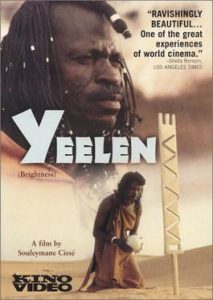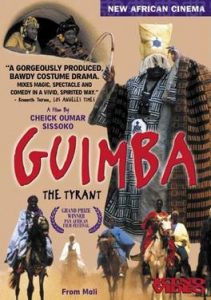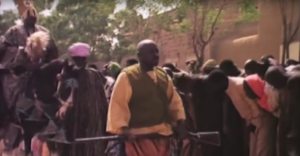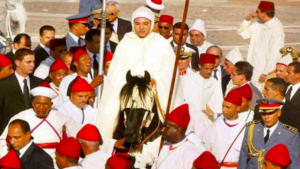Mandé is one of the numerous languages spoken in the West African region. Mandé groups can be found in many West African countries generally in Mali and Sénégal, but also Liberia, Niger, and Nigeria. Mandé people settled their own culture and traditions long before the arrival of Islam. Even though we cannot neglect the huge influence that Islam had on Mandé culture, but it survived the ‘Arabization’ and ‘Islamization’ throughout history, which raise an interesting question.
- Did Islam adapt to the Mandé culture or vice-versa?
- What are the beliefs that remained from the ‘Islamization’ process?
To answer our research questions, we will critically overview two Malian movies that portray Mandé culture in the pre-Islam era and post-Islamization. The movies are respectively “Yeelen” directed by Souleymane Cissé, and “Guimba the Tyrant” by Cheick Oumar Sissoko. That is why, our paper will first discuss the pre-Islam and post-Islam eras of Mandé practices, then compare the two periods of time using the historical context of the Malian Empire to finally conclude an understanding of the current fascinating Mandé culture.
Yeelen 1987

It is known that in pre-colonial Africa, there were three different social classes, which are the free people, autocrats, and slaves. So the existence of such social classes tells us that in fact kingdoms of Africa had some sort of organized régime. In the Malian Empire, for instance, those classes can be divided into two types: Landowners and the rest. The king’s slaves, also known as “Cheddo” had the right to own slaves too (Ntarangwi and others, 2006). The movies “Yeelen”, of Souleymane Cissé, illustrates the pre-Islam culture in Mali and portrays the social classes of the Mandé people and how they worked (Pritchard, 1989). According to the academic film, the social class of an individual is based on social position, and not an income as it is defined in our today’s societies. Social classes in Mandé culture are defined by merit, and one’s power can change to higher or social status. In the movies, the Griot stole King Sundiata Keita’s blacksmith to gain power and climb the social ladder.
During the ideological expansion of Islam in the Golden Age, some ethnic groups did not accept Islam and refused to adapt their culture. For example, Islam did not succeed to affect the non-Muslim tribes in Mali, known as Dogon of Mali, who believe in God Amma and ‘aliens’ (Horle, 2013). However, other ethnic groups, such as the Wodaabe in Niger, accepted Islam and began to define themselves as Muslims by only taking what fits into their initial culture. For instance, Wodaabe people do not fast nor pray, but they practice polygamy because it matches their traditions. Most Islamic states do not consider them to be Muslims for the simple reason of not being ‘Muslim enough’ (gertrudemcmullen, 2006).
Guimba the Tyrant 1995

The Kingdom of Morocco used to be Shia and Khawarij based during the Idrisid dynasty until Youssef Ibn Tachfine converted the Kingdom to the Sunni Madhab in the 12th century. Unlike Saudi Arabia where Sufism is seen as Bida’a, Morocco refused Wahhabism since Sufism was crucial with the Moroccan “Zaouia”s and people. Moroccan Sufism is was independent of the state, thus Sufis were not the main Madhab in Moroccan Islam. Sufism became crucial to West Africans only after they were conquered by Morocco in the 16th century. Morocco invaded the empire of Mali in 1599, which gave a chance to smaller new states to emerge, and Mandé culture was introduced to Islam. However, West African Sufism is very different from the Moroccan one, which can be noticed in real life. For instance in Sénégale, people have allegiance to their local leaders and they know to which sub-group they belong to in Tijani Madhab thanks to their Tasbih size and its number of beads. That is why West Africans do not care if their Tijani leader is appointed by the Moroccan king, what matters for them is their local leaders.
“…A funny fact is that their (Senegalese Muslims) Sufi leaders are so respected that ‘Café Tuba’, which is a coffee with pepper brand, became the most sold if Sénégale after it got the blessing of Tuba’s cheikh.”
Dr. John Shoup, Ph.D. Anthropology (1984), 2017

The arrival of Islam surely positively affected Mandé culture. The first written constitution in history was the Mandé constitution, which happened thanks to the Arabization that comes alongside Islamization. In our second film, “Guimba the tyrant” by Cheikh Oumar Sissoko, we can notice how the Mandé culture was influenced by Islam, which leads to the establishment of a constitution and abolishment of the slave trade. Islam does not allow slavery and sees everybody as equal, which changed the West African social structure that was heavily based on the slave trade. “Guimba the Tyrant” shows clearly the events of this transition and Islamization. According to the film, King Sundiata Keita took refuge in a Muslim tribe and became the Sufi leader’s advisor. Afterward, King Sundiata Keita got into power to rule his people and created the first constitution in the world in the 13thcentury, which consisted of 14 articles. Indeed, King Sundiata claimed that he is descended from Bilal Habeshi, companion of Prophet Mohamed, and has origins from Habesha, current Ethiopia. Even though Islam made contact with Mandé state, the Empire of Ghana, and Lu’Lus before, most Sahel countries today claim that they are descendants from Musa Ibn Nusayr, an Arab leader who ruled over North African provinces (Ntarangwi and others, 2006).

We conclude from the two Malian academic films that West Africans succeeded to balance between Islam and their original culture, and practically it works perfectly for them; for example, the second-largest city in Sénégale today is self-ruled by Sufis, called Touba, and it is having a remarkable economic growth with no internal conflicts. Nevertheless, West African Islam is negatively seen by other Muslim states. For instance, Fulani people claim that their Sufism is better than Jihadism even if Sufism is not linked to Jihad at all. Sufism is known to be the most peaceful branch of Islam, but in West Africa somehow they linked their Sufism to Jihad.
“There are two kinds of Sufi groups. “Qadiri”, who is an Arab Sufi group and the largest in the world, and “Tijani”, who are all the other Sufi groups that are not Qadiri. Cheikh Usman dan Fodio is the founder of the Islamic State in Nigeria, known as Sokoto, and he was Tijani.”
Jack Kalpakian, Ph.D. in Political Science, 2018
The city of Timbuktu in current Mali became the capital of Mandé Stata and an attraction towards Islamic learning. However, Morocco raided Timbuktu in 1591 and looted all the books in their libraries, which was taken back to Marrakech, the capital of Morocco at the time. That is why currently Marrakech and Fez are still destinations for countless West African religious scholars. Later on, the Jollof kingdom was conquered by Mali, but the Wolof people were not much influenced by Malians.
For these reasons, Muslims in Sénégale have allegiance to their Sufi leaders more than their monarchs or the government itself, because they see them as traitors and colonial agents. So unlike what it is a common thought, most Africans converted to Islam during and after the colonial era. Nowadays, West African Islam is doing great on how it is perceived by their society.
References:
- Cheick Oumar Sissoko, Guimba the Tyrant, 1995
- E. E. Evans-Pritchard, “Kinship and Marriage among the Nuer”, introduction, page ix-xxv, Social structure, Family, religion Nuer people
- Mwenda Ntarangwi, David Mills, Mustafa Babiker, “African Anthropologies”, Chapter 9: An Invisible Religion? Anthropology’s Avoidance of Islam in Africa, Robert Launay, page 188 – 203, 2006
- Gertrudemcmullen. “Wodaabe: Herdsmen of the Sun.” YouTube, YouTube, 19 Mar. 2012,
- www.youtube.com/watch?v=MlnO1QDqpaQ.
- Piep, Horle. “Dogon Tribe & the Sirius Mystery.” YouTube, YouTube, 1 June 2013.
- Roy, Christopher. “Speaking With God: A Mossi Diviner.”, YouTube, 22 Nov. 2014,
- Souleyman Cissé, Yeleen, 1987

